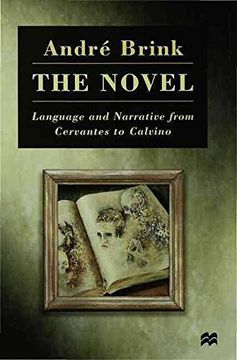Reseña del libro "The Novel: Language and Narrative From Cervantes to Calvino (en Inglés)"
"The novel, Brink argues, is not about representation but the self-conscious play of language. From its inception, he suggests, the genre has been about the act of writing and self-reflection. This thesis is not new but is part of the currency of postmodern literary theory. Brink, himself a noted South African novelist, the author of some 12 books, including A Dry White Season (1984), and a university professor, brings the insight of an insider. He surveys 15 celebrated novels, historically arranged from Don Quixote and La Princesse de Cleves to A.S. Byatt's Possession and Italo Calvino's If on a Winter Night a Traveller examining each in terms of its play with writing and language. His discussions are marked by clarity, insight, and comprehension. A valuable book." --Thomas L. Cooksey, Library Journal "What a treat to explore the novel as a genre through the lucid eyes of Andre Brink, himself one of the world's foremost novelists! I particularly enjoyed the way in which the most traditional novels were revealed as contemporary and entirely relevant." --Ariel Dorfman The postmodernist novel has become famous for the extremes of its narcissistic involvement with language. In this challenging and wide-ranging new study, Andre Brink argues that this self-consciousness has been a defining characteristic of the novel since its inception. Taking as his starting point "the propensity for story" embedded in all language, he demonstrates that the old familiar novels may be the more startlingly modern, while postmodernist texts remain more firmly rooted in convention. From the beginnings of the genre with Don Quixote, through "classic" novels of the eighteenth and nineteenth centuries and modern and postmodern texts of the twentieth, Brink performs a sweeping analysis of 500 years of the novel, including Moll Flanders, Emma, Madame Bovary, The Trial, One Hundred Years of Solitude, and Possession. As an internationally recognized novelist, he brings a unique critical eye and enthusiasm to his exploration of the genre, offering the reader a refreshing and rewarding introduction to the novel and narrative theory.

